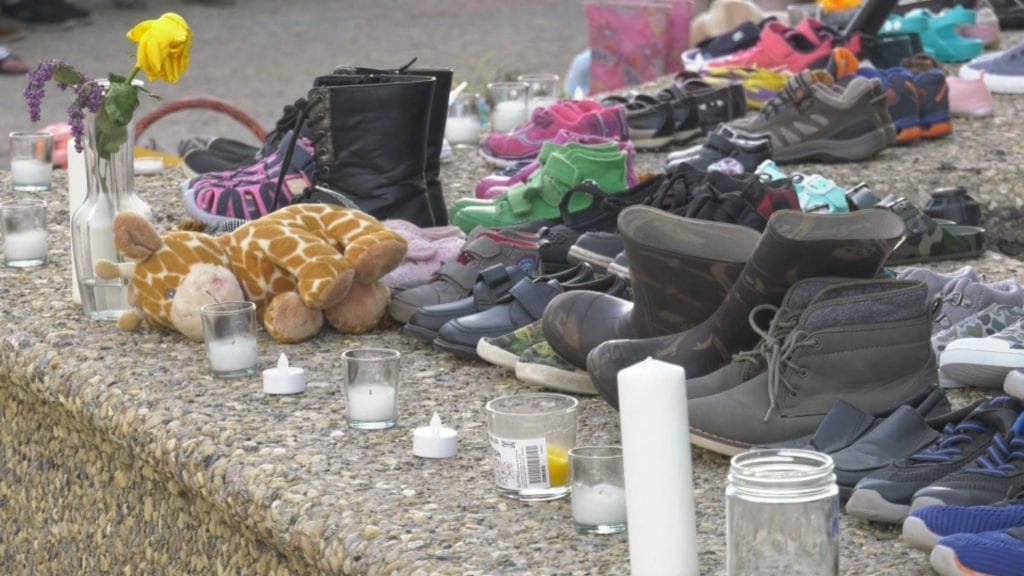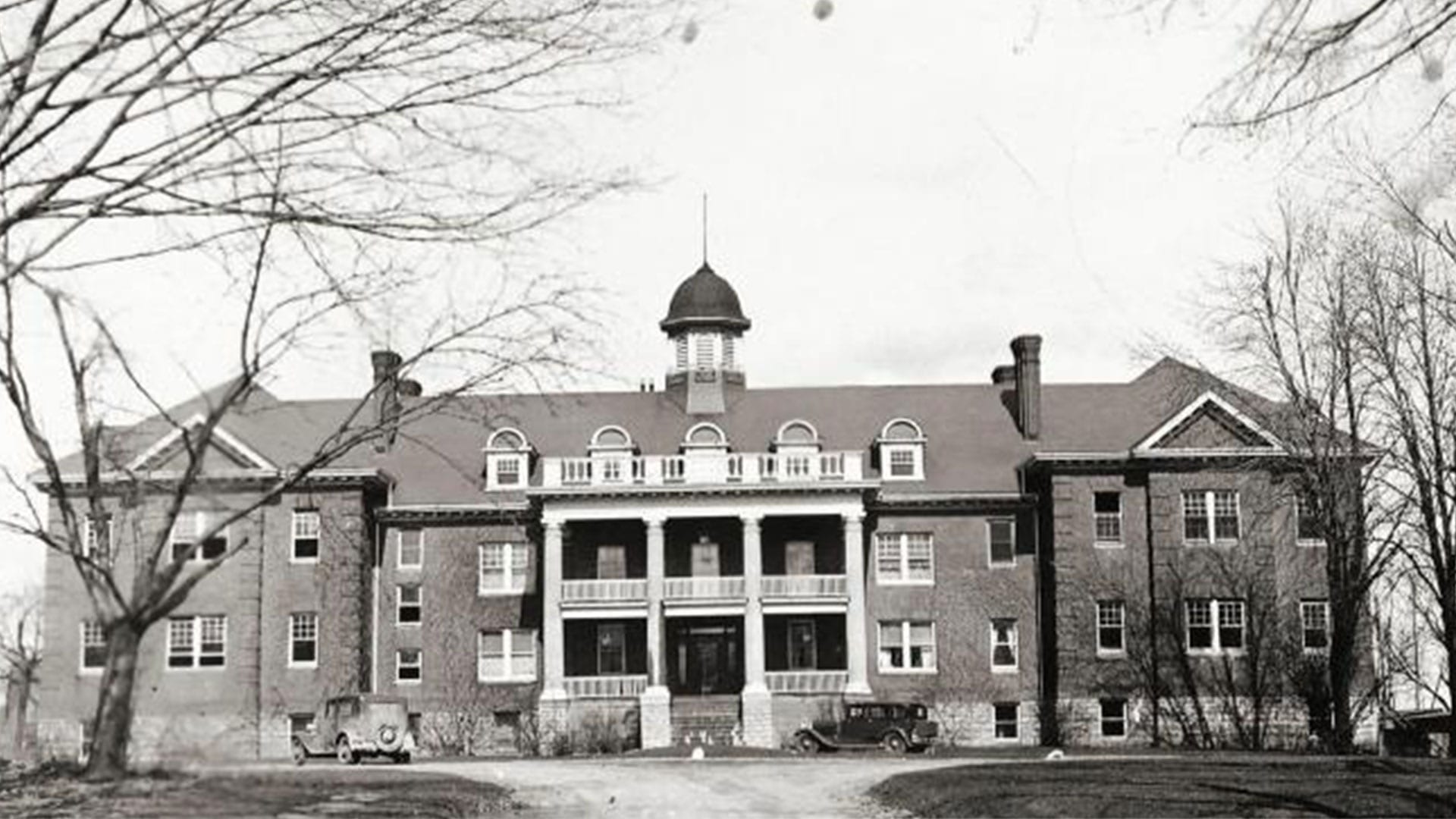
Warning: This story has disturbing details about Indian residential schools. If you are feeling triggered, the National Indian Residential School Crisis Hotline can be reached at 1-866-925-4419.
Bearskin Lake First Nation in Ontario says it will use July 1 as a “day of mourning” until the federal government acts on finding missing children who went to Indian schools across the country.
The nation released a letter sparked by the confirmation of graves on the former site of the Kamloops Residential School by Tk’emlúps te Secwépemc Nation in British Columbia on May 27.
“As Indigenous leaders we are deeply saddened by this tragedy and – while we have our own stories to tell about the trauma we suffered in the school established here – we will use July 1st, 2021 to honour the innocent, defenseless children who died in the Kamloops Residential School,” wrote Bearskin Lake First Nation Chief Lefty Kamenawatamin.
The First Nation, located 626 km north of Thunder Bay, is demanding that Ottawa “carry out exhaustive investigations into all former residential school grounds across the country.
“Until then, Bearskin Lake First Nation will mark Canada Day as a day of mourning. July 1 will be used to memorialize all the children and families who endured residential schools and to acknowledge the role the Canadian government and the churches played in the attempted genocide of Indigenous people.”
Search here for the locations of residential schools in Canada.
Last school standing in Saskatchewan
The Muskowekwan First Nation honoured children who disappeared from residential school in Saskatchewan.
Elders and members held a ceremony Tuesday at the site of the last standing residential school in its original form in Saskatchewan.
They placed 35 pairs of children’s moccasins and shoes to honour those who disappeared from the Muscowequan Indian Residential School.
The prayer vigil also honoured the remains of 215 children who were recently confirmed at the site of the former Kamloops residential school.
The Federation of Sovereign Indigenous Nations said unmarked, unidentified graves were discovered on the site of the Muscowequan Indian Residential School during waterline construction in the early 1990s.
In 2018 and 2019, with the use of ground-penetrating radar, the nation found at least 35 unmarked graves.
Officials say with further research they expect to find more.
The school opened in the 1880s and closed in 1997.
Six Nations wants to start search

The chief of Six Nations of the Grand River wrote to Prime Minister Justin Trudeau demanding that Ottawa “take action” to search the Ontario community’s old school grounds.
“This past Friday, the old wounds of my people and of other Indigenous peoples were reopened in a most visceral way,” wrote Mark Hill in the letter dated May 31.
Quoting from the final report of the Truth and Reconciliation Commission, Hill directed officials to the final report Volume 4 that dealt with the school.
“Indian Affairs official Marin Benson wrote in 1914 that students at the Mohawk Institute in Brantford, Ontario were being “disciplined to death.” It continues, “Because there was no policy, there was no limit on the number of blows or the degree of injury that could be inflicted.”
Six Nations of the Grand River is the largest First Nation in Canada and is located about 100 km southwest of Toronto.
Hill asked the prime minister “to take action in equipping Six Nations to immediately conduct a comprehensive search for missing children on and around the grounds of the former Mohawk Institute.
“The Mohawk Institute, commonly known as the Mush Hole, was one of the first of the Residential Schools and had the longest-running history. This meant it was unregulated and unaccountable from the start. With the discovery of the 215 children in Kamloops, there are no excuses for not taking aggressive action to find all the lost ones at any such locations across Canada, including the Mohawk Institute.”
Alberta funding research into ‘undocumented deaths’
On May 31, Alberta’s minister of Indigenous relations announced the province will fund research “into the undocumented deaths and burials of hundreds of Indigenous children who did not make their way home,” said Rick Wilson in a statement.
Details of the funding will be announced “in the coming days,” he added in a release.
Alberta had 25 residential schools operating in its jurisdiction.
“Finding their graves is a matter of reconciliation and another step toward closure for families,” Wilson said.
“Many of the schools have been destroyed and while their general location is known, the exact coordinates are missing. It is also possible that children were buried in locations such as nearby churches.”
In 2015, former premier Rachel Notley apologized for the province’s role in residential schools.
Quebec open to searching residential school sites for possible graves
Quebec’s Indigenous Affairs Minister says the province is open to searching the grounds of former residential schools for graves if survivors and their families are in favour.
Ian Lafreniere says his office has started reaching out to families, Indigenous leaders, and his federal counterpart to discuss the possibility.
The discovery of the remains of 215 children on the grounds of the former Kamloops Indian Residential School in British Columbia has prompted a fresh wave of scrutiny of the treatment of Indigenous people across Canada, and Lafreniere says Quebec must confront its own role in that history.
He says he has seen no evidence that there are unmarked graves on the grounds of the six former residential schools that operated in the province, but he cannot exclude the possibility.
His government has already tabled a bill that would allow relatives of Indigenous children who disappeared or died in health-care facilities to access information about their loved ones.
Lafreniere said the government isn’t ruling out any potential actions in the future to ensure Indigenous families get answers, including holding a public inquiry if necessary.
Kamloops residential school work will be long and ‘respectful’
According to Kukpi7 Chief Roseanne Casamir, whose mother and grandmother attended the school, there is more work to be done.
“We are the responsible caretakers here,” she told APTN’s Tina House. “These children are our responsibility.”
Casamir said her nation is reaching out to other communities in the Yukon, B.C. and the United States to bring them up to date on where the reclamation process is going.
“There will have to be more searches. This is just one section that we’ve had work done on,” she said.
Prime Minister Justin Trudeau promised “concrete action” at a news conference in Ottawa Monday and indicated he would meet with his cabinet to discuss the issue this week.









